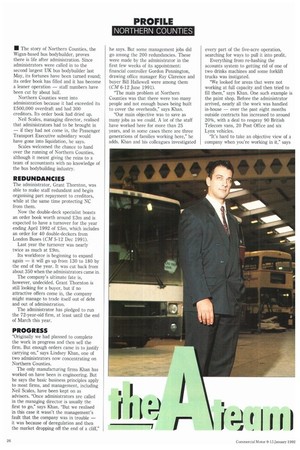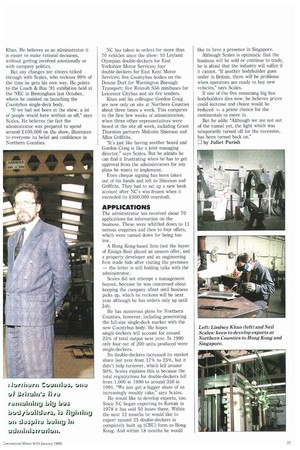• The story of Northern Counties, the Wigan-based bus bodybuilder,
Page 28

Page 29

If you've noticed an error in this article please click here to report it so we can fix it.
proves there is life after administration. Since administrators were called in to the second largest UK bus bodybuilder last May, its fortunes have been turned round; its order book has filled and it has become a leaner operation — staff numbers have been cut by about half.
Northern Counties went into
administration because it had exceeded its £500,000 overdraft and had 300 creditors. Its order book had dried up. Neil Scales, managing director, realised that administrators had to be brought in — if they had not come in, the Passenger Transport Executive subsidiary would have gone into liquidation, he says. Scales welcomed the chance to hand over the running of Northern Counties, although it meant giving the reins to a team of accountants with no knowledge of the bus bodybuilding industry.
REDUNDANCIES
The administrator, Grant Thornton, was able to make staff redundant and begin organising part repayment to creditors, while at the same time protecting NC from them.
Now the double-deck specialist boasts an order book worth around Om and is expected to have a turnover for the year ending April 1992 of £5m, which includes an order for 40 double-deckers from London Buses (CM 5-12 Dec 1991).
Last year the turnover was nearly twice as much at £9m.
Its workforce is beginning to expand again — it will go up from 130 to 180 by the end of the year. It was cut back from about 350 when the administrators came in.
The company's ultimate fate is, however, undecided. Grant Thornton is still looking for a buyer, but if no attractive offers come in, the company might manage to trade itself out of debt and out of administration.
The administrator has pledged to run the 72-year-old firm, at least until the end of March this year.
PROGRESS
"Originally we had planned to complete the work in progress and then sell the firm. But enough orders came in to justify carrying on," says Lindsey Khan, one of two administrators now concentrating on Northern Counties.
The only manufacturing firms Khan has worked on have been in engineering. But he says the basic business principles apply to most firms, and management, including Neil Scales, have been kept on as advisers. "Once administrators are called in the managing director is usually the first to go," says Khan. "But we realised in this case it wasn't the management's fault that the company was in trouble — it was because of deregulation and then the market dropping off the end of a cliff,"
he says. But some management jobs did go among the 200 redundancies. These were made by the administrator in the first few weeks of its appointment: financial controller Gordon Pennington, drawing office manager Ray Clarence and buyer Bill Hallewell were among them (CM 6-12 June 1991).
"The main problem at Northern Counties was that there were too many people and not enough buses being built to cover the overheads," says Khan.
"Our main objective was to save as many jobs as we could. A lot of the staff have worked here for more than 25 years, and in some cases there are three generations of families working here," he adds. Khan and his colleagues investigated every part of the five-acre operation, searching for ways to pull it into profit.
Everything from re-hashing the accounts system to getting rid of one of two drinks machines and some forklift trucks was instigated.
"We looked for areas that were not working at full capacity and then tried to fill them," says Khan. One such example is the paint shop. Before the administrator arrived, nearly all the work was handled in-house — over the past eight months outside contracts has increased to around 20%, with a deal to respray 90 British Telecom vans, 20 Post Office and six Lynx vehicles.
"It's hard to take an objective view of a company when you're working in it," says Khan. He believes as an administrator it is easier to make rational decisions, without getting involved emotionally or with company politics.
But any changes are always talked through with Scales, who reckons 99% of the time he gets his own way. He points to the Coach & Bus '91 exhibition held at the NEC in Birmingham last October, where he insisted on launching the Countybus single-deck body.
"If we had not been at the show, a lot of people would have written us off," says Scales. He believes the fact the administrator was prepared to spend around £100,000 on the show, illustrates to everyone its belief and confidence in Northern Counties. NC has taken in orders for more than 70 vehicles since the show; 10 Leyland Olympian double-deckers for East Yorkshire Motor Services; four double-deckers for East Kent Motor Services; five Countybus bodies on the Dennis Dart for Warrington Borough Transport; five Renault 556 minibuses for Leicester Citybus and six fire tenders.
Khan and his colleague Gordon Craig are now only on site at Northern Counties about three times a week. This compares to the first few weeks of administration, when three other representatives were based at the site all week, including Grant Thornton partners Malcolm Shierson and Allan Griffiths, "It's just like having another board and Gordon Craig is like a joint managing director," says Scales. But he admits he can find it frustrating when he has to get approval from the administrators for any plans he wants to implement.
Even cheque signing has been taken out of his hands and left to Shierson and Griffiths. They had to set up a new bank account after NC's was frozen when it exceeded its £500,000 overdraft.
APPLICATIONS
The administrator has received about 70 applications for information on the business. These were whittled down to 11 serious enquiries and then to four offers, which were turned down for being too low.
A Hong Kong-based firm (not the buyer of Ensign Bus) placed an unseen offer, and a property developer and an engineering firm made bids after visiting the premises — the latter is still holding talks with the administrator.
Scales did not attempt a management buyout, because he was concerned about keeping the company afloat until business picks up, which he reckons will be next year although he has orders only up until July.
He has numerous plans for Northern Counties, however, including penetrating the full-size single-deck market with the new Countybus body. He hopes single-deckers will account for around 25% of total output next year. In 1990 only four out of 200 units produced were single-deckers.
Its double-deckers increased its market share last year from 17% to 25%, but it didn't help turnover, which fell around 50%. Scales explains this is because the total registrations for double-deckers fell from 1,000 in 1990 to around 350 in 1991. "We just got a bigger share of an increasingly mouldy cake," says Scales.
He would like to develop exports, too. Since NC began exporting to Kuwait in 1978 it has sold 50 buses there. Within the next 12 months he would like to export around 25 double-deckers in completely built up (CBU) form to Hong Kong. And within 18 months he would like to have a presence in Singapore.
Although Scales is optimistic that the business will be sold or continue to trade, he is afraid that the industry will suffer if it cannot. "If another bodybuilder goes under in Britain, there will be problems when operators are ready to buy new vehicles," says Scales.
If one of the five remaining big bus bodybuilders dies now, he believes prices could increase and choice would be reduced — a prime chance for the continentals to move in.
But he adds: "Although we are not out of the tunnel yet, the light which was temporarily turned off for the recession, has been turned back on."
El by Juliet Parish
































































